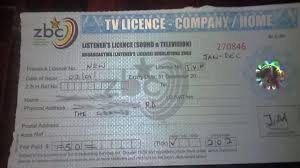
Thousands, if not millions, of households across Zimbabwe have a satellite television connection.
Some opt for pay-per-view services, while others use free-to-air channels.
With the advent of technology and new media, many television viewers and radio listeners have resorted to internet-based shows from Africa, Asia, Europe, and the Americas. This shift is largely because the public broadcaster, ZBCtv and its radio stations, offer subpar programming.
For over two decades, ZBC has failed its audience. Shows like My Wife and Kids, which concluded production in 2005, and outdated Chinese movies and cartoons dominate the schedule.
The only time many Zimbabweans tune into ZBCtv is for the “NewsHour” at 8 pm. Beyond that, the programming is simply atrocious. Yet, ZBC collects millions of United States dollars in licence fees.
For a household television and radio licence, it costs US$100 per year, while a private radio licence for vehicles attracts a US$92 fee per year. There are 1,5 million registered cars in Zimbabwe, giving ZBC Holdings over US$140 million in fees.
Companies are hit even harder, with a US$200 annual fee for a car radio, US$200 for a television and radio licence, and US$100 for a radio licence. Rural residents pay US$20 per year for a radio licence, and urban dwellers fork out US$40.
What a rip-off! It’s disheartening that the government has the audacity to craft draconian legislation, making it mandatory for motorists to pay for the vehicle radio licence before obtaining insurance and vehicle licences. The Information, Broadcasting and Media Services Ministry — ZBC’s parent ministry — claims these fees are meant to broaden the parastatal’s revenue base.
- Trophy hunting drives African lion into extinction
- Prove how we ‘rig’ polls: Zec
- CCC youths camp at Chin‘ono home
- Self-care tips to boost your mental health
Keep Reading
These exorbitant fees allow the public broadcaster to remain lazy, without implementing any strategic revenue generation initiatives.
Comparatively, some countries in the Sadc region do not charge for radio and television licences at all. The ones that do, they do not charge radio car licence fees. Only in Zimbabwe!
It’s shocking for people in Zambia, Mozambique, Tanzania and Malawi to learn that Zimbabweans are being choked by these unnecessary charges. There are no such fees in these countries, while South Africa charges an equivalent of almost US$19 per annum, Eswatini around US$9 and Zambia about US$0,20 per month for a television licence.
If ZBC were broadcasting quality programmes, the argument might be different. But alas, there is nothing to look forward to.
Under the circumstances, it boggles the mind why authorities focus on “broadening revenue bases” by further burdening already overtaxed Zimbabweans.
PAYE for the 10% formally employed Zimbabweans is insane, and there are a plethora of taxes on transactions — the infamous 2%, fuel charges, data, airtime, withholding, and excise duty. All these taxes drain hard-pressed Zimbabweans.
The government must stop milking Zimbabweans. It needs to urgently revise the high ZBC fees to provide some relief to Zimbabweans. People are already suffering; it’s time to consider the plight of ordinary citizens. On the other hand, ZBC must give its viewers and listeners value for their money.
The cost of living has spiked in the past months since the taxes came into effect on January 1. From increased fuel taxes and value-added tax (VAT) on essential goods to the introduction of a sugar levy, the 2024 National Budget exacerbated pain, especially for low-income earners. With the mid-term budget announcement expected next month, it is going to get worse.
Zimbabweans are already financially strained. This includes everyone — the elderly, children, the unemployed — they are all taxed heavily.
Even the disabled are punished for their disabilities. Finance minister Mthuli Ncube did the unthinkable this year; he introduced a 15% tax on essential aids for the disabled, dubbed the ‘disability tax’. This includes prescription eyeglasses, hearing aids, Braille reading material, Braille typewriters, Braille wristwatches, motorised and non-motorised wheelchairs, and even crutches.
Pleas from people with disabilities and ordinary Zimbabweans to reconsider this regressive tax and show compassion fell on deaf ears.
What an insensitive government! Zimbabweans are some of the lowest-paid people in the world.
Around 90% of the population hustles to make a living.
The government wants to raise funds for the public broadcaster. But it doesn’t mean it has to be callous.
It is economically unjust and morally wrong to continue taking from an overtaxed population.











